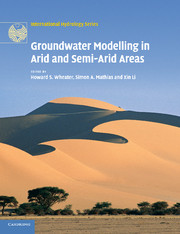Book contents
- Frontmatter
- Contents
- Contributors
- Preface
- Acknowledgements
- 1 Groundwater modelling in arid and semi-arid areas: an introduction
- 2 Hydrological processes, groundwater recharge and surface-water/groundwater interactions in arid and semi-arid areas
- 3 Conceptual models for recharge sequences in arid and semi-arid regions using isotopic and geochemical methods
- 4 Groundwater flow and transport
- 5 Performing unbiased groundwater modelling: application of the theory of regionalised variables
- 6 Groundwater vulnerability and protection
- 7 Variable density groundwater flow: from modelling to applications
- 8 Sustainable water management in arid and semi-arid regions
- Index
- Plate section
- References
3 - Conceptual models for recharge sequences in arid and semi-arid regions using isotopic and geochemical methods
Published online by Cambridge University Press: 06 December 2010
- Frontmatter
- Contents
- Contributors
- Preface
- Acknowledgements
- 1 Groundwater modelling in arid and semi-arid areas: an introduction
- 2 Hydrological processes, groundwater recharge and surface-water/groundwater interactions in arid and semi-arid areas
- 3 Conceptual models for recharge sequences in arid and semi-arid regions using isotopic and geochemical methods
- 4 Groundwater flow and transport
- 5 Performing unbiased groundwater modelling: application of the theory of regionalised variables
- 6 Groundwater vulnerability and protection
- 7 Variable density groundwater flow: from modelling to applications
- 8 Sustainable water management in arid and semi-arid regions
- Index
- Plate section
- References
Summary
INTRODUCTION
Groundwater quality issues now assume major importance in semi-arid and arid zones, since scarce reserves of groundwater (both renewable and non-renewable) are under threat due to accelerated development as well as a range of direct human impacts. In earlier times, settlement and human migration in Africa and the Middle East regions were strictly controlled by the locations and access to fresh water mainly close to the few major perennial rivers such as the Nile, or to springs and oases, representing key discharge points of large aquifers that had been replenished during wetter periods of the Holocene and the Pleistocene. This is a recurring theme in writings of all the early civilisations where water is valued and revered (Issar,1990). The memory of the Holocene sea-level rise and pluvial periods is indicated in the story of the Flood (Genesis 7:10) and groundwater quality is referred to in the book of Exodus (15:20). More recent climate change may also be referred to in the Koran (Sura 34:16).
In present times, groundwater forms the primary source of drinking water in arid and semi-arid regions, since river flows are unreliable and large freshwater lakes are either ephemeral (e.g. Lake Chad) or no longer exist. The rules of use and exploitation have changed dramatically over the past few decades by the introduction of advanced drilling technology for groundwater (often available alongside oil exploitation), as well as the introduction of mechanised pumps.
- Type
- Chapter
- Information
- Groundwater Modelling in Arid and Semi-Arid Areas , pp. 21 - 38Publisher: Cambridge University PressPrint publication year: 2010
References
- 3
- Cited by

